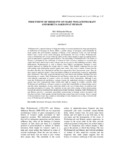| dc.contributor.author | Hasan, Md. Mahmudul | |
| dc.date.accessioned | 2010-10-13T08:31:57Z | |
| dc.date.available | 2010-10-13T08:31:57Z | |
| dc.date.issued | 2004 | |
| dc.identifier.uri | http://hdl.handle.net/10361/495 | |
| dc.description.abstract | Wollstonecraft’s supreme honour of being the mother of western feminism has been questioned by an indictment of misogyny by Susan Gubar; a similar charge of misogyny could potentially be made against the proto-feminist standing of Rokeya if her polemical works are eyed through Gubar’s lens. Taylor, in her article Misogyny and Feminism: The Case of Mary Wollstonecraft, comes to Wollstonecraft’s rescue while the author of this article intends to apply an antidote before such an indictment is registered against Rokeya. The misreading of Wollstonecraft’s The Rights of Woman is prompted by her criticisms of women for their excessive attention to vocations that
render them more subservient to men’s desires and an easy prey to their inhibiting measures. What differentiates Wollstonecraft as well as Rokeya from Gubar’s paradigmatic feminists is their atypical approach to righting the wrongs done to women. Their feminist campaign does not end with making some disparaging remarks against men; rather, they want to sanitise women from the
frivolities that they have internalised and that have appeared as their characteristic traits. They pit their atypical approach against a long masculinist tradition of mesmerising women by applauding their weaknesses. They take an unconventional tactic and criticise the feminine attributes that men find pleasing in women. Both Wollstonecraft and Rokeya argue that the apparent frivolities that seem inherent components of women’s selves are actually social constructions. Although it may
seem that Wollstonecraft and Rokeya castigate women, the underhand criticism is actually aimed against men who systematically deny women their right to engage in worthier activities. Both
Wollstonecraft and Rokeya call upon women to assume full responsibility as human beings and to end their abject dependence on men, which they think is the way to bring about a revolution in the masculine perception of women. The similarity in tone and in the coinage of their diction points towards the universal sisterhood that modern postcolonial feminists champion. Both Wollstonecraft and Rokeya perceive a systematic masculinist manoeuvring in keeping women fascinated with frivolous activities. Their agendas include disaffecting women from such vocations. Beer’s concept of the presentism of past may counteract misreading of early feminist texts as they evolved in the cases of Wollstonecraft and Rokeya. | en_US |
| dc.language.iso | en | en_US |
| dc.publisher | BRAC University | en_US |
| dc.relation.ispartofseries | BRAC University Journal, BRAC University;Vol.1, No.2,pp. 1-12 | |
| dc.subject | Indictment | en_US |
| dc.subject | Misogyny | en_US |
| dc.subject | Susan Gubar | en_US |
| dc.subject | Rokeya | en_US |
| dc.title | Indictment of misogyny on mary wollstonecraft and Rokeya Sakhawat Hussain | en_US |
| dc.type | Article | en_US |

